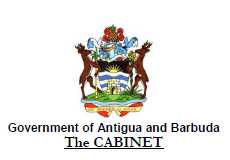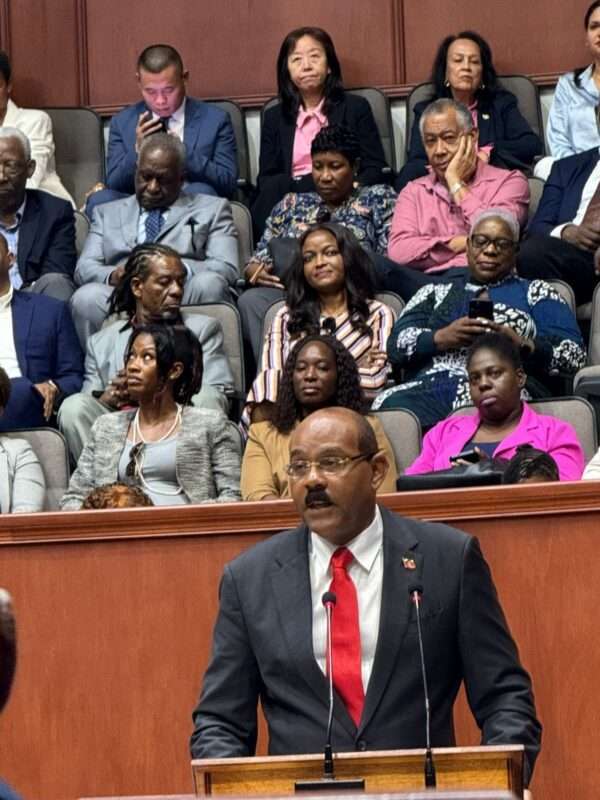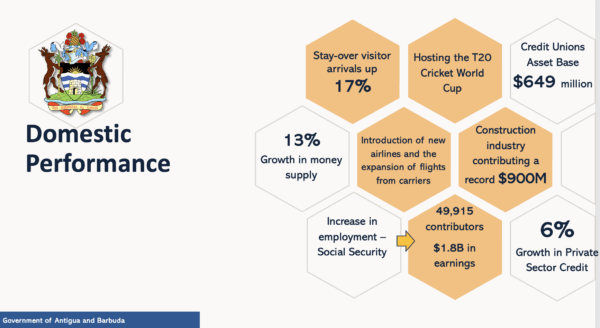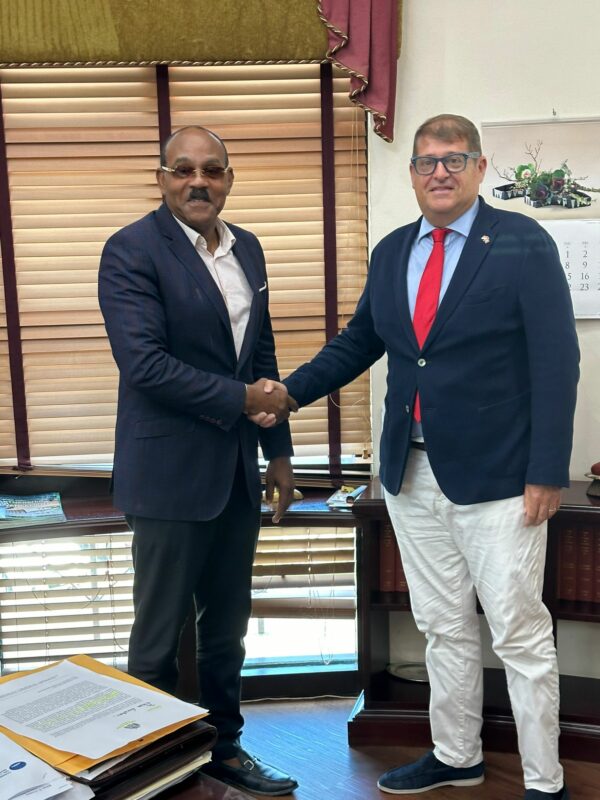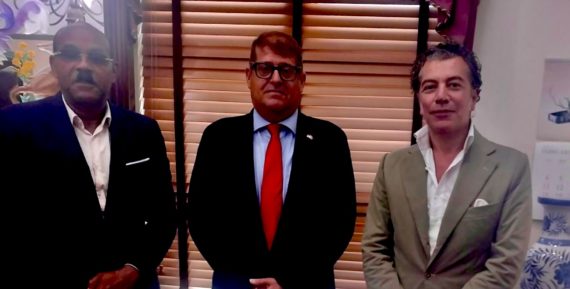Collectively, the member states of these United Nations are failing in our responsibility to our one planet and in our duty to the peoples, of our one world.
At each of the past 74 sessions of this General Assembly, many pledges have been made, to make the international community less inequitable; many commitments have been given to lift-up the poor and the vulnerable; and many declarations have been issued to end the scourge of war.
Yet, in the 74 years that have passed since the first session of this General Assembly, on 10th January 1946, the world has experienced only brief efforts to deliver these pledges, commitments, and declarations.
Those efforts were vital.
They made a difference.
With each of them, mankind made some progress on the path to human equality, environmental safety, and global security.
But, despite them, the benefits of wider inclusive international cooperation are now being sacrificed by the powerful, on the altar of attaining their narrower exclusive national advantage.
Never before, has the world had such ample technical and financial resources to address the challenges facing all mankind, including the ravages of Climate Change, pandemics, food security, malnutrition, hunger and poverty.
The problem is, that these resources are concentrated in the Capitals of a few nations, which have retreated from contributing to meet those challenges and to overcome them for the good of all humanity.
As this Assembly is held, developing countries – particularly small states – are trapped, in a downward spiral of economic decline and environmental degradation which they did not create, and over which they have no control.
There are no trends identifiable today, no programmes, or policies that offer hope of narrowing the gap between rich and poor, let alone to bridge it.
What the world is witnessing, is a march by the richest nations away from any obligations to global good.
The drums of nationalism are drowning out the cries for global solidarity without which, the world’s peace, progress and prosperity will never be assured, nor will the principles upon which the United Nations organization was founded, ever be satisfied.
This is not the future we want. That is not the future we deserve.
If ever there was a time for the nations of the world to jointly confront threats to all of them – the time is now.
The COVID-19 pandemic has brought that realization directly in the face of all our nations.
It is global in its sweep and universal in its dangers.
Not only has it visited a public health emergency on each nation; it has wreaked economic havoc in all of them.
The perils of the pandemic loom large across the globe, jumping across the divides of national borders and defying the belief that rich nations can survive, while poorer nations succumb.
The pandemic has added to the dangers of Climate Change which is, as pernicious as the COVID-19 pandemic in its reach, and insidious in its impact.
The poor and the vulnerable are already the first to suffer from the economic impact of COVID-19 and Climate Change, but the rich have not been spared.
And narrow nationalist policies that undermine international cooperation will make matters worse, not better.
Every nation of the world is a marketplace for others.
The chain of supply and sales are global.
Countries are now inextricably interlinked for tourism and business by air and sea transportation, and also, by the goods and services we each buy and supply, including in science and technology.
No nation, however wealthy, can survive if its markets dwindle and its sources of supply decline.
We are all inter-dependent, however large or small.
The unity of human needs, requires a functional multilateral system that respects the democratic principles of sovereignty, participation and consent; rejecting the bullying doctrine of exclusion, imposition and abuse of economic sanctions.
Yet, even though the countries of the Caribbean are among the greatest victims of the profligacy of others, in relation to the creation of Climate Change and its effects; and, although our economies are among the worst impacted by the COVID-19 pandemic, in whose creation we played no part; we are denied a voice in international decision-making and we are subjected unfairly to the will of others.
The Economic Commission for Latin America and the Caribbean (ECLAC) is forecasting that the Gross Domestic Product (GDP) of the Caribbean will contract by 6.9 per cent in 2020, because of the effects of COVID-19 on our economies.
This is eroding the gains made by my own country, Antigua and Barbuda where, in January of this year, we were set to achieve over 6.2 per cent growth, in addition to an average growth rate of 5 per cent in the previous six years.
As a country, highly dependent on tourism, the closure of borders, the cessation of cruise tourism and the limits on aviation, effectively devastated our economy overnight, resulting not only in serious loss of revenues, but also in sudden and significant loss of jobs.
Governments have had to expend enormous resources, spending as high as, 8% of GDP, to mitigate the impact of the public health crisis, amid this extraordinary decline in revenues and foreign exchange.
In the case of my own small country, we have been denied loans from the International Financial Institutions (IFIs) because of the skewed per capita income criterion, applied by their policy-making Boards.
The result has been that, apart from a line of credit from the Inter-American Development Bank, that is yet to be consummated, Antigua and Barbuda has received not one cent from the International Financial Institutions, to help us meet the enormous challenges that have brought much larger countries to their knees.
In our own case, the approach of the Paris Club of official debt holders has been particularly callous; absolutely insensitive during this unprecedented global pandemic.
The Paris Club has not found it possible to agree to suspension of debt payments, debt rescheduling, or debt forgiveness, to allow countries like mine an opportunity to cope with the extraordinary challenges confronting us and in which we played no part in creating.
Amidst, the circumstances of dwindled revenues and extraordinary expenses, the Paris Club is demanding repayment of decades old delinquent loans that simply cannot be repaid at this time.
What is worse, with no sympathy for the dire conditions we face, the Paris Club blocked the IMF from considering financial assistance and debt service relief, provided to many others, unless we subject ourselves to a programme that would lead to an increased debt service burden and even more austere conditions for our people than presently exists.
That, we cannot do and certainly will not entertain.
As our economy weakens, with an insufficient response by the international community for debt rescheduling and access to concessional financing, unemployment and poverty are growing.
Nonetheless, the people of my country are moving on with resilience, bravely and resolutely.
We reaffirm our commitment to multilateralism, and we are doing our part in tackling COVID-19 within our boundaries and by contributing to multilateral action.
I am proud that, despite all the challenges with which we were confronted, Antigua and Barbuda has successfully managed the COVID-19 pandemic, by quickly detecting and treating infected persons and through effective contact tracing to prevent community spread.
Antigua and Barbuda has recorded only three deaths since the pandemic started.
Presently, we have just one active laboratory confirmed case of COVID-19 infection, despite re-opening our borders on June 1st, to daily commercial flights from North America and Europe, in an attempt to earn some revenues from the vital tourism sector to protect lives and livelihoods.
My Government has also invested in modern medical facilities, including a well-equipped Infectious Diseases Centre, manned by trained, qualified and experienced personnel.
In addition, we have expanded and upgraded our health facilities to three beds per 1000 of population and improved our tertiary health care services.
All of this has been achieved despite inadequate assistance from the International Financial Institutions, to mitigate the impact of the pandemic on our economy.
If this situation continues without an appropriate response from the international community, many countries, like mine, will be unable to pay existing debt and will not qualify for new borrowings.
Even if, these countries all end up in IMF programmes to give them short-term relief, unless there is suspension of debt payments, debt forgiveness and debt rescheduling, they will not recover their economies; they will certainly not achieve the UN sustainable development goals, and their debt stock will be enlarged by the compound interest that will result from unpaid debts.
Unfortunately, the economic development they have so far achieved will be reversed with little prospect of recovery.
This is not the world we want; proactive financial intervention by the IFI’s is needed now, not tomorrow; tomorrow’s intervention may be too late.
As Alicia Bárcena, the Executive Secretary of the UN Economic Commission for Latin America and the Caribbean has pointed out:
“The leaders of the G20 should be in favour of multilateral organizations making loans at favourable interest rates and alleviating the debt of countries that are highly indebted, deferring it or forgiving it. If that does not occur, the payments will be impossible and fiscal space will be compromised. Exceptional measures are required to confront an unprecedented crisis. There will be no progress without international cooperation and solidarity”.
This is a statement we endorse in its entirety. The socio-economic sustainability of the region will be compromised without a proactive debt suspension and restructuring and ultimately debt relief.
Distinguished delegates, the future we should all want requires the establishment of a new era of multilateralism, based on the premise that the life of every human being matters.
And that, in living their lives, every human being should be given the opportunity to prosper – free from intimidation, hunger, malnutrition, disease and war.
Our nations – united – should affirm their commitment to that goal and work diligently to achieve it.
That is the United Nations we need.
Thank you.
The Honourable Gaston Browne
Prime Minister of Antigua and Barbuda
